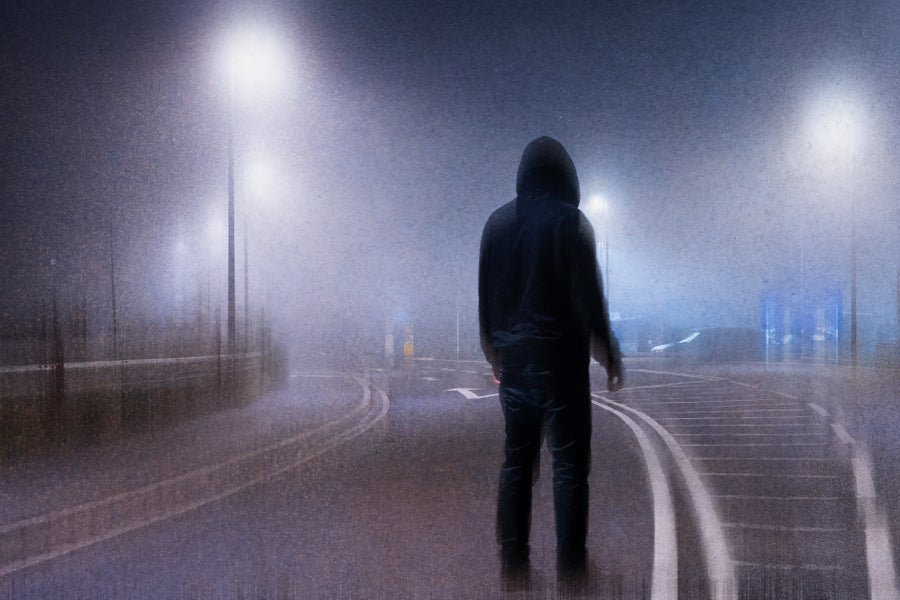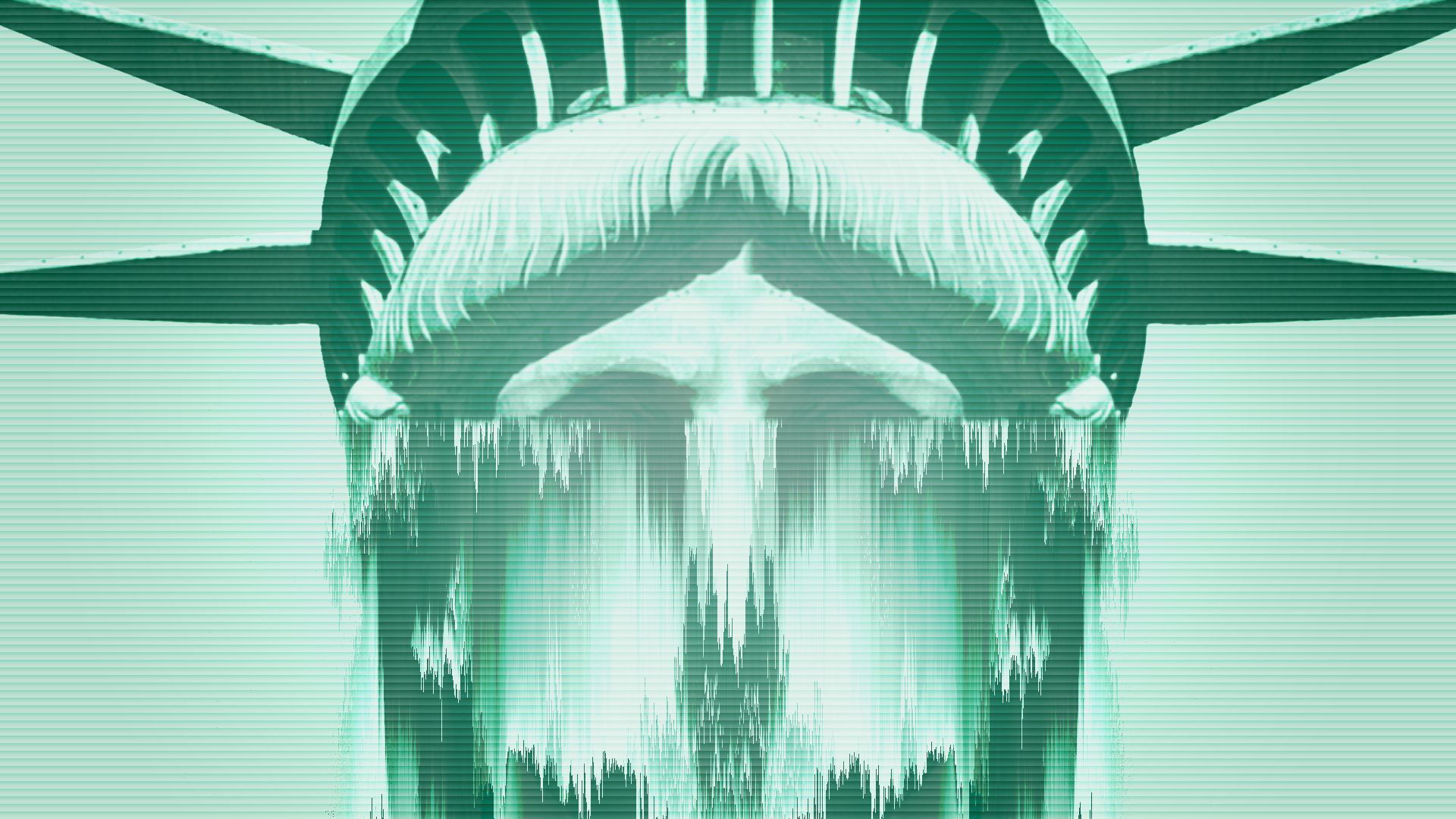- A Tom Gauld cartoon illustrating tribalism — “Our Blessed Homeland” vs. “Their Barbarous Wastes”;
- Anti-woke teachers in public schools;
- Abrahm Lustgarten on the American climate migration (which applies to the wider world, of course);
- More from John Gartner about Trump’s dementia; and how Sunday’s Doonesbury illustrates it;
- Why people believe the myth of high crime rates;
- And how politics and social media have exaggerated America’s political divide;
- And an endpiece about dealing with the estate of my late friend Larry K.
Tribalism, as illustrated by Tom Gauld. (The graphic is all over social media so I feel safe displaying it here.) This illustrates virtually every conflict in human history, I suspect.

\
Similarly, it’s only “indoctrination” when it’s someone with a different story than yours doing the instructing.

Washington Post, Hannah Natanson, 15 Apr 2024: They quit liberal public schools. Now they teach kids to be anti-‘woke.’
Actually, it’s indoctrination when it’s about tribal mythology (not only if it’s different from yours) and not about evidence from the objective world.
\\
Some thing most Americans apparently don’t understand.

AlterNet, Abrahm Lustgarten (from ProPublica), 14 Apr 2024: The complex, contradictory and heartbreaking process of American climate migration is underway
Here’s another example of a person in the news — with a new book, On the Move: The Overheating Earth and the Uprooting of America — turning up in more than one place. Lustgarten was on KQED’s Forum on March 27th, talking this exact subject.
Another great American migration is now underway, this time forced by the warming that is altering how and where people can live. For now, it’s just a trickle. But in the corners of the country’s most vulnerable landscapes — on the shores of its sinking bayous and on the eroding bluffs of its coastal defenses — populations are already in disarray.
The writer’s book focuses on America — but this is the same issue in large part responsible for the mass immigration at the US southern border (and from Africa to Europe). Living conditions to the south becoming untenable. And climate change/global warming is mostly due to the advanced nations, like the US, most of whose citizens seem oblivious to the root causes of migration.
\\
We’ve seen this about John Gartner before. Here’s another piece.

The Big Picture, Jay Kuo interviewing John Gartner, 11 Apr 2024: Trump’s Brain Is Not Okay, subtitled “An expert’s view of Trump’s mental slide into dementia.”
We hear a lot about Biden’s age and gaffes, to the point where most Americans cite Biden’s age but not Trump’s as a big issue for the election, even though they are only three years apart. Based on what you and other experts have observed, why are you sounding the alarm about Trump, but not about Biden?
I call it the “double lie.” Pathologizing Biden’s normal aging is the first lie. Normalizing Trump’s dementia is the second. The sorts of small lapses we’ve seen in Biden are part and parcel of normal aging. Forgetting names and dates doesn’t make us seniors less competent. What we lack in memory we more than make up for in judgment, experience, and wisdom. Other cultures revere their elders, but America in 2024 mocks and devalues theirs. The problem isn’t old people in government—the dreaded “gerontocracy.” It’s age-ism.
There’s a long list of “phonemic aphasias”, e.g. “‘President U-licious S Grant’ (For Ulysses S. Grant)”, which I will resist quoting in full.
\\
Garry Trudeau hit this same theme on the head in yesterday’s Doonsbury, which I probably should not display here, for copyright reasons — but which you can see by clicking the link. Sample panel, Trump speaking: “Besides, when you take a look at old people, they can’t drive, they can’t read menmews… minyous… but they can do ballot! They do the ballot so powerfully!” And: “That’s why we love the cognishly umpired!”
Trump did once say “I love the poorly educated.” (Documented everywhere, e.g. here.)
\\

Scientific American, Sara Novak, 11 Apr 2024: Why We Believe the Myth of High Crime Rates, subtitled “The crime issue, a focus of the 2024 presidential election, is sometimes rooted in the misplaced fears of people who live in some of the safest places”
Americans are convinced that they are living in a world ravaged by crime. In major cities, we fear riding public transportation or going out after dark. We buy weapons for self-defense and skip our nightly jogs. Next to the weather, the explosion of crime is a favorite topic of conversation. The overwhelming consensus is that crime is only getting worse. According to a Gallup poll, in late 2022, 78 percent of Americans contended that there was more crime than there used to be.
These perceptions would make sense if they were accurate, but they aren’t. Crime, in fact, is down in the U.S., rivaling low levels that haven’t been seen since the 1960s. According to FBI data, violent crime rates dropped by 8 percent and property crime dropped by about 6 percent by the third quarter of last year, compared with the same period in 2022. Still, the reality of these optimistic statistics doesn’t quell people’s fears.
Many reasons, mostly explained via the various psychological biases I’ve been preoccupied with in recent years; partisanship (conservatives don’t believe in evidence or statistics); and the effects of social media.
\\
A palate cleanser. I’ve been aware of this, intellectually, as I’m also aware that I tend to highlight examples of MAGA lunacy because they suit my provisional conclusions about conservatives vs. liberals. Again: intellectually, I know that MAGA extremists, even conspiracy theory extremists, are a relatively small fraction of the population. It’s just that social media, and the filters they develop based on our tastes, reinforce any one’s biases.
And yet, and yet– I still don’t know how to explain the support for Trump, unless a huge portion of the American population is delusional and/or amoral.

Axios, Jim VandeHei and Mike Allen, 9 Apr 2024: Behind the Curtain: America’s reality distortion machine
Here’s a wild thought experiment: What if we’ve been deceived into thinking we’re more divided, more dysfunctional and more defeated than we actually are?
Why it matters: Well, there’s compelling evidence we’ve been trapped in a reality distortion bubble — social media, cable TV and tribal political wars — long enough to warp our view of the reality around us.
…
The big picture: Yes, deep divisions exist on some topics. But on almost every topic of monthly outrage, it’s a fringe view — or example — amplified by the loudest voices on social media and politicians driving it.
And the writers I read — Haidt, Pinker, Shermer, et al — understand this. Brin makes this point in Polemical Judo (reviewed here.) Americans agree on more than they disagree.
The piece goes on with many examples. And ends with this.
Here’s a thought experiment to end on (Jim does this during speeches after testing it on his kids and friends):
- In a given year, you meet scores or more people you spend enough time with to appraise their character. Think about them: How many do you think are decent, normal people who do volunteer work, help shovel after a storm, look out for family and neighbors?
The answer will help pop your reality distortion bubble.
As I’ve said before, in ordinary interactions with neighbors, or people in airports, or anywhere, most people are decent and kind. That’s why religion and politics are considered topics not to discuss in polite conversation.
Endpiece
Making slow progress on dealing with the estate of my old friend Larry Kramer, who died last September near Austin, Texas. A will was found. I’m the sole beneficiary, and executor. The courts work slowly. It’s taken until last week to officially establish me as executor, so that I can deal with Larry’s accounts and creditors. I’ll finally go to Austin at the end of this month to survey his property, to contact officials. Even to find the mortuary where his body is — nothing has been done about this yet.
On the plus side, going through his mail, and his laptop, he did not have lots of accounts to deal with. Only a few. That will make dealing with those few, closing them, a simpler deal than I had worried about.





